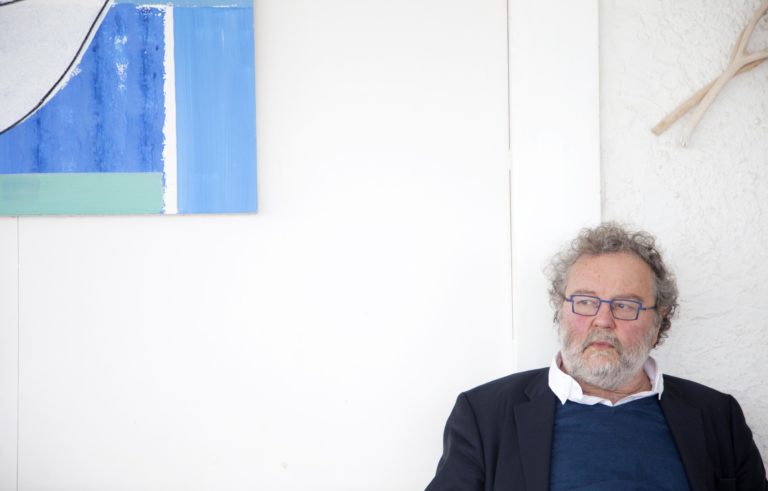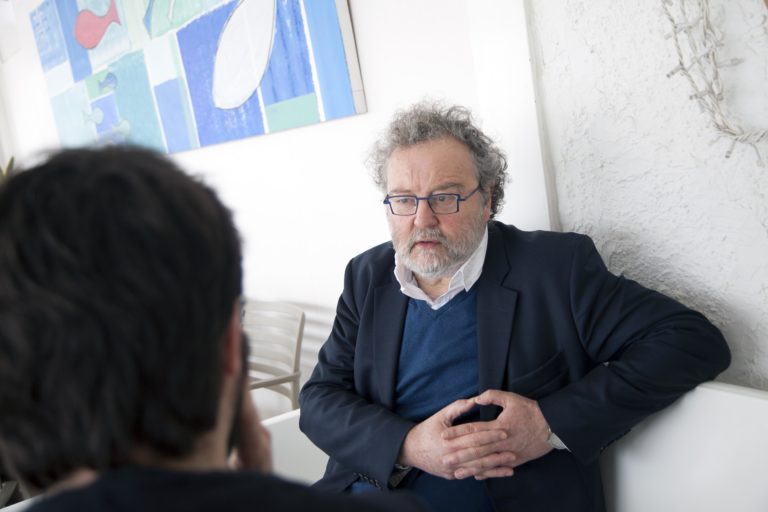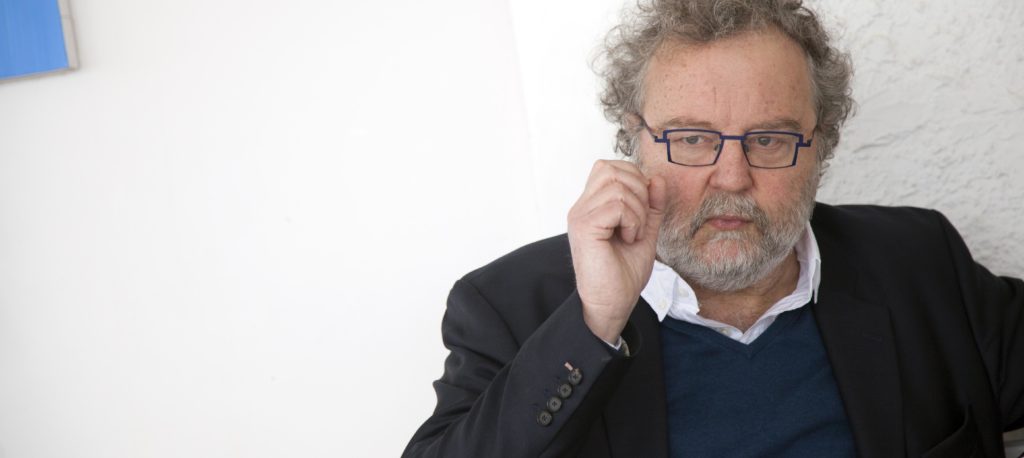09.04.2018 - 10:15
|
Actualització: 09.04.2018 - 10:28
John Carlin (London, 1956) has travelled the world as a reporter. He saw the end of apartheid first-hand as a foreign correspondent writing for The Independent. He then sought a new destination, but his knowledge of South Africa, the conflict and Nelson Mandela led him to pen his most stunning title to date: Playing the Enemy: Nelson Mandela and the Game That Made a Nation, a book where he describes Mandela’s powers of seduction on his political opponents.
Carlin finds that most international political leaders lack Mandela’s political finesse, respect for one’s opponent, talent and strategic vision. Spain and Catalonia are no exception. He has never hidden the fact that he opposes Scottish and Catalan independence, but he finds Spain’s crackdown on Catalonia particularly shocking. He is disappointed in Spain, a country which he expected to be more democratic.
Following some articles criticising the Spanish government’s stance on Catalan separatism, in October last year Carlin was sacked by El País , the Madrid daily where he had been a contributor for years. He discusses that in this interview with VilaWeb, and asks himself how come Spain’s territorial issues can elicit such a visceral response in so many Spaniards, to the point that any deviation from the official party line is penalised.

—How do you see the current state of affairs in Catalonia?
—I suspect that there will have to be a referendum sooner or later, but we are in limbo at the moment. It looks as if the pro-independence movement has lost momentum and there is some in-fighting going on, but it doesn’t mean that the desire to be independent, which a significant percentage of Catalans feel, will just go away. The events of the last few months, the baton charges in October, the arrests, the people who remain in prison, combined with the perception by many Catalans that Madrid has not shown them respect over the last six or seven years have all bred a feeling of resentment that many have kept bottled up inside. This might not be so obvious today, but it won’t be forgotten. There is resentment and it is here to stay and that —among other things— will keep the separatist sentiment going.
—Spain’s repression could leave its mark on many people for generations to come.
—You must never underestimate resentment. Never. It is an incredibly powerful emotion. You can feel resentment against your father for something he did when you were fifteen. That leaves a mark, a bitterness which you will likely carry with you for the rest of your life. And not just against your dad, but against the world. It is powerful on a personal level, but also on a group scale. Resentment is a very powerful driver of human actions, on a personal, family, group and national level.
—Could you have ever imagined the extent of Spain’s repression?
—I lived in Spain for several years. My mother is Spanish and I have many relatives in Madrid. For years I lived in some sort of golden dream where Spain was a modern democracy and everything was great. But the last six months have been a huge disappointment in terms of what I can see in Spanish politics in general. And I am including Catalonia’s pro-independence camp here. But I feel more disappointed by the response of the Spanish state and its establishment against Catalonia, which strikes me as more sinister.
—The Spanish newspapers claim it is exemplary.
—People have written to Spanish papers to voice their outrage and decry that writers such as myself and some foreign media have argued that Spain is not a modern democracy. They claim that it is. Well, sorry mate, but it is not. And the outrage and passion with which people insist that Spain is a modern, democratic country reveals a certain inferiority complex which I never thought they had. It is depressing, the inferiority complex of many Spaniards against other countries such as the UK. Uncovering the dark, revengeful, cruel, crass, absolutist side of Spain’s political establishment in general —and, in particular, of the PP government— has been a disappointment.
—Do you find the PSOE’s position disappointing, too?
—In the last few years the PSOE could have insisted more in order to find a negotiated solution, some dialogue …
—What about the Catalan independence movement?
—Look, I think the pro-independence camp has been incredibly irresponsible and infantile, too. They declared independence unilaterally following a referendum that never was. Instead, it was a political mobilisation for which they ought to have found greater social and parliamentary support. When I look at some of these secessionist leaders, they remind me of college-age politicians playing a game on campus, far removed from the real world by their idealism. They haven’t got both feet on the ground and that will hurt people and, eventually, it will hurt them, too. But the Spanish government’s duty was to take on the grownup’s role and, in a way, theirs has also been an infantile position, albeit with weapons. And behaving like bullies.

—You have criticised the establishment, but the general public in Spain have accepted the crackdown on Catalonia.
—They have, indeed. My disappointment is over Spain as a whole. Perhaps this was more obvious to me than to Catalans. I travel a lot across Spain and, as I’m not Catalan, people are frank and tell me how they feel about Catalans. If you, as a Catalan, travel to Cadiz, they might be more polite to you. But, particularly in the last four or five years, I’ve been shocked —and it’s been really hard— by how it is perfectly normal for people to badmouth Catalans, even people who are friendly, nice and progressive. There is something, here. There is a widespread anti-Catalan sentiment in Spain. I don’t know the percentage, but the PP and other political parties have worked out that some voters will shun them unless they jump on the bandwagon. It’s rather depressing. But it is also a powerful argument for the pro-independence bloc. I have always opposed them and I still do, in a rational way. But in the last few years I have come to understand the separatist drive much better. Deep down, it think it’s all about emotions and separatism is also based on emotional factors.
—Independence supporters in Catalonia used to be in a minority, but they have multiplied in the last few years due to many factors.
—Yes, and I’ve written about that. The big question for me is, how come they have grown from 14 to 50 per cent in such a short time. It is a question which people refuse to answer in the rest of Spain. And every time I broach the subject with friends and acquaintances in Madrid who oppose Catalan independence viscerally, I tell them that all my Catalan friends say the same: lack of respect, abuse. And they look at me as if I was a child who understands nothing. “How do you mean, abuse? What are you on about?” And they tell me that it’s all down to Catalans not wanting to share their wealth. Their inability to comprehend the emotional factor behind the growth of the separatist sentiment in Catalonia is extraordinary. The rest of Spain is completely unable to grasp the political mentality and emotion that you have in Catalonia. It is as if you told them about Syria: they don’t get it. Still, not everyone is like that in Madrid, especially among young people. I see a glimmer of hope there. Many times I think that Spain could do with a generational change.
—Is that the other Spain?
—Yes. I generally see that in the young. I won’t say it’s infallible, but there might be a difference between the people who were born and raised under Franco and those who weren’t. Those over the age of fifty, the ruling age group that makes up the establishment, were brought up during that period and they are beyond repair: their insecurities about being Spanish in this world, about Spain breaking up, about the unity of their country … Young people seem more confident; they’ve travelled more, have better English … In contrast, I see the previous generation has hang-ups and an absolutist, dictatorial, Francoist mentality, the remnants of the regime. Me, I need to believe that the younger generations —those in their twenties, thirties and forties— will change all that. It is depressing to see that dark side, the absolutist heavy-handedness, coupled with their pathetically stupid complexes and their insecurity. It is deplorable.
—In Madrid it’s difficult to maintain a public discourse that differs from the official line on the subject of Catalonia. Is that why El País let you go?
—It’s like there is no individual thought. Either you stand with us one hundred per cent or you are against us. In my case, I’ve always made it clear in my writings and interviews that I do not support separatism, neither in Scotland nor in Catalonia. But that is not enough. You must absolutely scorn secessionists, almost hate them and systematically disrespect them in a visible manner. Opposing the idea is not enough. You are expected to combat those who support independence, endorse the Spanish government’s position, uphold the law and the constitution. And you must do so one hundred per cent. I find it interesting how Podemos have kept a low profile. I get the impression that, given the prevailing anti-Catalan sentiment, they’ve had to tone down their message because they reckon they’d lose votes.
—Is it really such a widespread feeling?
—Look, round about Christmas last year I was discussing Catalonia with a very intelligent, very bright person from Madrid. I was saying that both sides are to blame for the mess. And I was having a perfectly rational, intelligent conversation with this man when, all of a sudden, he said that independence supporters were Nazis. And I told him that I could not continue our conversation because it was impossible to have a rational discussion. It is an eye-opener when someone like him, such an intelligent individual, claims that those people are Nazis: you catch a glimpse of the irrational, nearly mad streak behind the whole thing. If someone who is brilliant talks like that, I don’t even want to think about the views of other kinds of people, including Rajoy and his lot. You talk to people and you can see their rage coming through. There was an element of irrational rage in El País’ decision to sack me.
—Catalan separatism has always argued for independence through peaceful means, but Madrid deals with it as they did with the Basque Country.
—You can only assume that many people in politics and the justice system feel the same way as my intelligent friend in Madrid and they believe that Catalan separatists are Nazis. When your initial premise is that Junqueras, the two Jordis and Puigdemont are Nazis, their imprisonment comes across as an admirable show of responsibility. Yes, they draw a parallel with ETA and Tejero [the Guardia Civil officer who attempted a coup in 1981], as if they had staged a coup d’état. They won’t even allow the Catalan prisoners to be moved to a Barcelona facility, like the ETA convicts which they keep in Extremadura prisons [very far from the Basque Country]. It is totally grotesque. That is all it takes to realise that Spain is not a true modern democracy. It is deplorable and an embarrassment.
—Has Spain’s international image taken a blow?
—Obviously, as with any country in the world, the general public couldn’t care less. Like Spanish people don’t care about what goes on in Poland. But people who think about it do feel the way I said earlier. I wonder if you read the editorial [register to access] in The Times some weeks ago. It was a damning editorial urging Rajoy to allow Puigdemont to return and engage in talks, written by a man who is not exactly a specialist in Spain, but it captured the views of many people on the subject. Had he written that in El Mundo or El País, he would have been sacked. And I know the man who wrote it: he is very conservative, hardly a progressive or a Marxist dreamer.

—You speak about your disappointment with Spain. But you know the Basque conflict very well and you could already see some very dark goings-on there.
—Having kept Arnaldo Otegi in jail for six or seven years was grotesque, too. Otegi was the Basque Country’s own Gerry Adams. And Adams’ hands were stained with blood: it is a fact that he was an IRA member. But not Otegi. Adams played a critically important role in achieving a peace deal for Ireland and Otegi was one of the three or four people who were instrumental to bringing peace to the Basque Country. However, Spain’s cruel, revengeful streak showed itself again. It is the kind of absolutist, legalistic thinking which is indicative of an utter inability for political action, an aversion to risk, and a lack of courage and imagination. I am very critical of Tony Blair, but I have to admit that what he did for Northern Ireland was admirable: he engaged in talks with terrorists who had killed many more people than ETA ever did. Blair was a pragmatist.
—You are very familiar with Mandela’s style, which was based on respect and recognition. Are you taken aback by Spain’s scornful attitude?
—If Mandela had been in Rajoy’s shoes back in 2012, after the massive rally on September 11 which gave momentum to the separatist movement, he would have resolved the whole thing within a week so that Spain could remain united. With gestures, by showing respect, courtesy and using dialogue. And with a sense of humour, which is absent here. This unyielding inflexibility … it must be the invisible expression of an insecurity, of a lack of political talent, of courage and vision … Everything which Mandela possessed.



